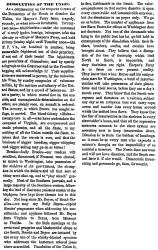Record Data
Transcription
DISSOLUTION OF THE UNION.
As a commentary on the frequent threats of the Democrats of the South to dissolve the Union, the Harper’s Ferry farce, tragedy, comedy, or what not – is invaluable. Twenty-two men – Abolitionists – under the command of a crazy leader, besiege, beleagure [beleaguer], take the city or village of Harper’s Ferry, and hold it from Sunday night until Tuesday noon – the F. F. V’s., six hundred in number, being meanwhile frightened out of their propriety, if not out of their boots! The inhabitants are powerless of themselves; and by speedy telegraph to the Goyernor [Governor] and to the President begging aid, acknowledge it! Their supplications are answered in person, by the redoubtable Wise, by sundry companies of volunteer militia, by the marines and infantry of the United States, and by a crowd of lookers-on. After a parley, in which mortal fear on the one side, and unconquerable determination on the other, are plainly seen, an assault is ordered. The Armory, in which Brown has sought refuge, is carried. The blood-thirsty villains – twenty-two in all – who have undertaken the conquest of Virginia, are overpowered and made prisoners, and all the State, to say nothing of all the Union outside the State, rejoices that the [illegible] is over, and that the business of nigger breeding, nigger whipping and nigger selling may go on as before!
Brooks-bully Brooks – our readers will recollect, threatened, if Fremont was elected, to march to Washington, take possession of the archives of the government, the strongbox in which the dollars and all that sort of thing were shut up, and to “play smash” generally. Most of the Southern journals, and a large majority of the Southern orators, following the lead of that most puissant master of the bludgeon, have kept these threats hot to this day. Not long since Mr. Boyce, of South Carolina – we may say Bully Boyce – copied Brooks’ programme when addressing his constituents: and applause followed Mr. Boyce from Virginia to Texas, from Missouri to Florida. In the little meetings at the cross-road groceries and blacksmiths’ shops of the South, Brooks and Boyce are imitated by the every one of the whisky-bloated spouters who addresses the butternut colored jeans there assembled. Dissolution of the Union is, in fact, fashionable in the South. The valorous gentleman in that section dissolve it upon every conceivable and inconceivable occasion; but the dissolution is on paper only. We go on as before. The number of applicants from the Slave States for offices at Washington does not decrease. Not one of the thousands who hang to the public teat has let go his hold in consequence of the dissolution which their fathers, brothers, uncles, and cousins have brought about. They believe that a disruption of the ties of fraternity which bind North to South, is impossible, and they doubtless are right. Harper’s Ferry is to them an ever present reality. They know that when Boyce and his compatriots start for Washington, a band of insurrectionists will take possession of their plantations and their towns, before they are a day’s march away. They know that the South now reposes and threatens on a volcano, subject any day to an irruption [eruption]that will carry rape, arson and murder into every house around which the melted lava flows. They know that the fear of insurrection is the skeleton in every slaveholder’s home, and that all the repressive measures common to the slave system are necessary now to keep insurrection down. Disunion is to them the baldest of humbugs, as it must be to every man who expends a minute’s thought on the impossibility of so suicidal a measure. The North does not want and will not have disunion, and the South cannot have it if she would. Democratic threatening and gasconade go, then, for naught.








